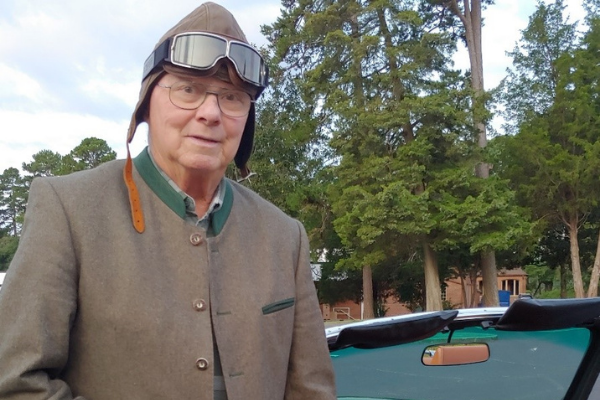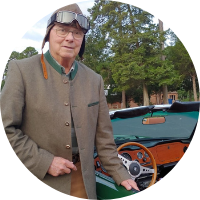
Did you choose retirement? Or was it chosen for you?
Both. Syngenta downsized in 2006 and offered a very generous separation package. Employees were asked to submit their preference for continued employment or separation (many choosing employment still received the package). I asked to work two more years and then receive the package. This was honored so I worked until 2008 and then received all the benefits of the full separation package. A year later I resumed working for Syngenta on a part-time basis until mid-2013.
Ironically, in March 2008, Syngenta asked me to return to Vietnam to teach mass spectrometry at the Northern Pesticide Residue Laboratory in Hanoi. It was a very rewarding experience and included a visit to Ha Long Bay.
How was the transition from the working world to retirement?
My retirement did not start as planned because I was diagnosed with cancer on my first day of retirement. Thus, all my pre-arranged travel plans for the next ten months were cancelled so I could undergo chemotherapy and surgery. The good news is that I have been cancer-free since 2009. My transition to retirement was relatively easy due to part-time employment.
Looking back, what do you wish you knew about retirement before you retired?
I did not realize how much I would miss the day-to-day interactions with colleagues, the joy of conducting ultra-trace level method development, data analysis, writing, etc. I also missed the occasional Syngenta project that required travel to Switzerland, China, India, Japan, The Netherlands, England, and South Africa, among others.
What do you enjoy most about being retired?
I love the balance in my life. I occasionally enjoy a slow pace but that can be entertaining for only a limited time. My wife and I have just enough fun-, volunteer-, and work-related activities to keep us busy but we still have time to slow down and unwind. It is also much easier to plan out-of-country travel when you don’t have to schedule company vacation time.
How do you stay connected to the chemistry enterprise as a retiree?
Staying active in the ACS is a great way to stay connected and I would recommend everyone serve the ACS and/or your local section in some capacity. It’s educational, entertaining, and rewarding. Plus, you get to know many wonderful people.
What do you like most about where you are living in retirement? What’s one thing you wish you could change about where you live?
I remained in the same area after retirement (Kernersville, NC). The best part is living near my two daughters and their families (four grandchildren). It also allows my wife and me to continue the many pre-retirement activities and friendships we enjoy. Plus, we are less than a 2-hour drive to the mountains and a 3.5-hour drive to the beaches.
Regrettably, the Triad area of NC is very popular and rapidly growing in population.
What advice do you have for people who are getting ready to retire?
I would advise retirees to thoroughly evaluate all the advantages and disadvantages of both relocating and downsizing. In the past, many retirees moved to warmer climates (e.g., AZ, FL). Today’s trend is to move closer to the grandkids. However, many of those in today’s workforce can expect to work at ten or more different job locations during their career. Thus, following your children and the grandkids might become challenging.
We also found that downsizing to a one-level home was desirable but we still wanted enough living and garage space to accommodate our lifestyle. Each retiree situation will be different and will require thorough evaluation to choose the best path forward. I wish all retirees a happy, satisfying, and productive retirement. Life is good.

Robert was born in Hohenwald, TN and grew up in TN, IN, and MD. After a tour in Vietnam as a U.S. Marine (Combined Action Program), he resumed studies at Middle Tennessee State University and earned a BS degree in chemistry. This was followed by employment as a chemist with the Food and Drug Division, Tennessee Department of Agriculture in Nashville, TN. This nurtured his interest in analytical chemistry and a desire to further his education. Thus, he later attended the University of Tennessee, Knoxville and obtained a PhD under the direction of professors Gleb Mamantov and Earl Wehry.
He then worked for CONOCO in Pittsburgh, PA for five years before moving to Greensboro, NC to work for Ciba-Geigy. This allowed him to renew his interests in chromatography and mass spectrometry. Through mergers and downsizings, Ciba-Geigy became Novartis in 1996 and Syngenta in 2000 (a merger of the agrochemical sectors of Novartis and Astra-Zeneca).
Robert joined the ACS when he was a graduate student. He eventually became active in the Central North Carolina (CNC) local section and served as Chair. He presently serves CNC as Councilor and Chair of the Senior Chemists Group and the ACS in the Senior Chemists Committee. He and his wife enjoy rallies and tours in their vintage Triumph sports car, travel, and hiking, among other activities.
This article has been edited for length and clarity. The opinions expressed in this article are the author's own and do not necessarily reflect the view of their employer or the American Chemical Society.










